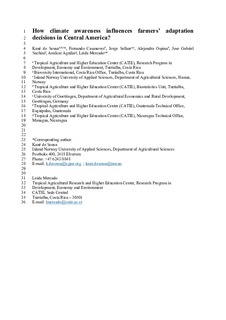How climate awareness influences farmers’ adaptation decisions in Central America?
de Sousa, Kaue; Casanoves, Fernando; Sellare, Jorge; Ospina, Alejandra; Suchini, Jose Gabriel; Aguilar, Amilcar; Mercado, Leida
Abstract
Central America is one of the regions with the highest vulnerability to climate change, with negative effects projected to affect its economy and food security. To address this issue, an integrative farm management approach such as Climate-Smart Agriculture can help reorient agricultural practices towards climate adaptation and food security. Past studies have shown that several factors can either hinder or encourage the adoptions of Climate-Smart practices, including subjective expectations and perceptions. Building on this literature, we analyze farmers' climate awareness and their perceptions regarding the change in climate patterns as well as their choices of farming practices to adapt to these changes. We show that reforestation was the preferred adaptation strategy among interviewed farmers and that educational profiles and the size of landholdings drive the adoption of this and other practices. Soil management and introduction of new crops are preferred by literate farms with large farmlands, whereas illiterate farmers with smaller farmland tend to move towards farm intensification with an increase in the utilization of external inputs. Our findings provide evidence to support the design of capacity development interventions targeting specific groups of farmers according to their main crop and education profile. How climate awareness influences farmers’ adaptation decisions in Central America?
